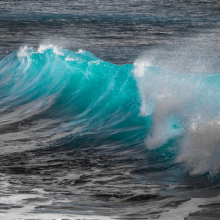What dictates the frequency of the waves?
We discover what it is that makes fewer or more waves crash against the shore each minute. Is it the tides, the sun or the number of surfers? Plus, we ask, why do we have fingerprints?
In this episode

00:00 - What dictates the frequency of waves?
What dictates the frequency of waves?
We put this question to Stephen Salter, retired Professor of Engineering Design at Edinburgh University...
The frequency of ocean waves depends on the wind speed, the time that the wind has been blowing and the length of the sea that it is been blowing over, which is what we call the fetch.
We actually prefer to talk about the period of waves, which is the inverse of frequency because people like to think about numbers greater than one rather than thinking about small decimals.
If you started with the wind blowing over calm water, the waves start with small heights and short lengths but these steadily increase.
In deep waters, the waves with the longer lengths travel more rapidly and the growth continues until the speed of the waves is about the same as the speed of the wind when it can't put any more energy in. And we describe this as a fully-developed sea.
There's actually been a mixture of periods and people are quarrelling about how you define the period in the mixture of them.
Real seas often have a spectrum with more than one peak, showing that the waves are coming from more than one place, or maybe that the wind speed changed while they were growing. Periods in seconds of the same sort of order as wind speeds measured in metres per second, a bit more or a bit less depending on how you define your period.
And most sea waves have periods in the range of 5 to 15 seconds with the longer ones coming when you had a really fast wind blowing for a long time over a long bit of sea...





Comments
Add a comment